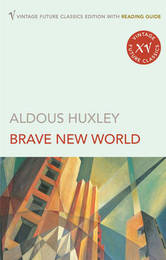
|
Brave New World
Paperback
Main Details
| Title |
Brave New World
|
| Authors and Contributors |
By (author) Aldous Huxley
|
|
Introduction by Margaret Atwood
|
| Physical Properties |
| Format:Paperback | | Pages:288 | | Dimensions(mm): Height 198,Width 130 |
|
| Category/Genre | Classic fiction (pre c 1945) |
|---|
| ISBN/Barcode |
9780099496977
|
| Classifications | Dewey:823.912 |
|---|
| Audience | |
|---|
|
Publishing Details |
| Publisher |
Vintage Publishing
|
| Imprint |
Vintage Classics
|
| Publication Date |
1 September 2005 |
| Publication Country |
United Kingdom
|
Description
Far in the future, the World Controllers have created the ideal society. Through clever use of genetic engineering, brainwashing and recreational sex and drugs all its members are happy consumers. Bernard Marx seems alone in feeling discontent. Harbouring an unnatural desire for solitude, and a perverse distaste for the pleasures of compulsory promiscuity, Bernard has an ill-defined longing to break free. A visit to one of the few remaining Savage Reservations where the old, imperfect life still continues, may be the cure for his distress-Huxley's ingenious fantasy of the future sheds a blazing light on the present and is considered to be his most enduring masterpiece.
Author Biography
Aldous Huxley was born on 26th July 1894 near Godalming, Surrey. He began writing poetry and short stories in his early twenties, but it was his first novel, 'Crome Yellow' (1921), which established his literary reputation. This was swiftly followed by 'Antic Hay' (1923), 'Those Barren Leaves' (1925) and 'Point Counter Point' (1928) - bright, brilliant satires in which Huxley wittily but ruthlessly passed judgement on the shortcomings of contemporary society. For most of the 1920s Huxley lived in Italy and an account of his experiences there can be found in 'Along The Road' (1925). The great novels of ideas, including his most famous work 'Brave New World' (published in 1932 this warned against the dehumanising aspects of scientific and material 'progress') and the pacifist novel 'Eyeless in Gaza' (1936) were accompanied by a series of wise and brilliant essays, collected in volume form under titles such as 'Music at Night' (1931) and 'Enda and Means' (1937). In 1937, at the height of his fame, Huxley left Europe to live in California, working for a time as a screenwriter in Hollywood. As the West braced itself for war, Huxley came increasingly to believe that the key to solving the world's problems lay in changing the individual through mystical enlightenment. The exploration of the inner life through mysticism and hallucinogenic drugs was to dominate his work for the rest of his life. His beliefs found expression in both fiction ('Time Must Have a Stop', 1944 and 'Island', 1962) and non-fiction ('The Perennial Philosophy', 1945, 'Grey Eminence', 1941 and the famous account of his first mescalin experience, 'The Doors of Perception', 1954. Huxley died in California on 22nd November 1963.
Reviews"It is impossible to read Brave New World without being impressed by Huxley's eerie glimpses into the present" * New Statesman * "The 20th century could be seen as a race between two versions of man-made hell - the jackbooted state totalitarianism of Orwell's Nineteen Eight-Four, and the hedonistic ersatz paradise of Brave New World, where absolutely everything is a consumer good and human beings are engineered to be happy" -- Margaret Atwood * Guardian * "Aldous Huxley was uncannily prophetic, a more astute guide to the future than any other 20th century novelist ... Nineteen Eighty-Four has never really arrived, but Brave New World is around us everywhere" -- JG Ballard "A brilliant tour de force, Brave New World may be read as a grave warning of the pitfalls that await uncontrolled scientific advance. Full of barbed wit and malice-spiked frankness. Provoking, stimulating, shocking and dazzling" * Observer * "What Aldous Huxley presented as fiction with the human hatcheries of Brave New World has become fact. The consequences are profound and, if we don't get it right, deeply disturbing" -- John Humphrys * Sunday Times *
|